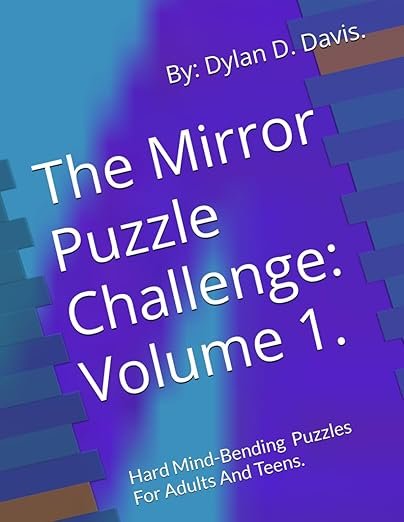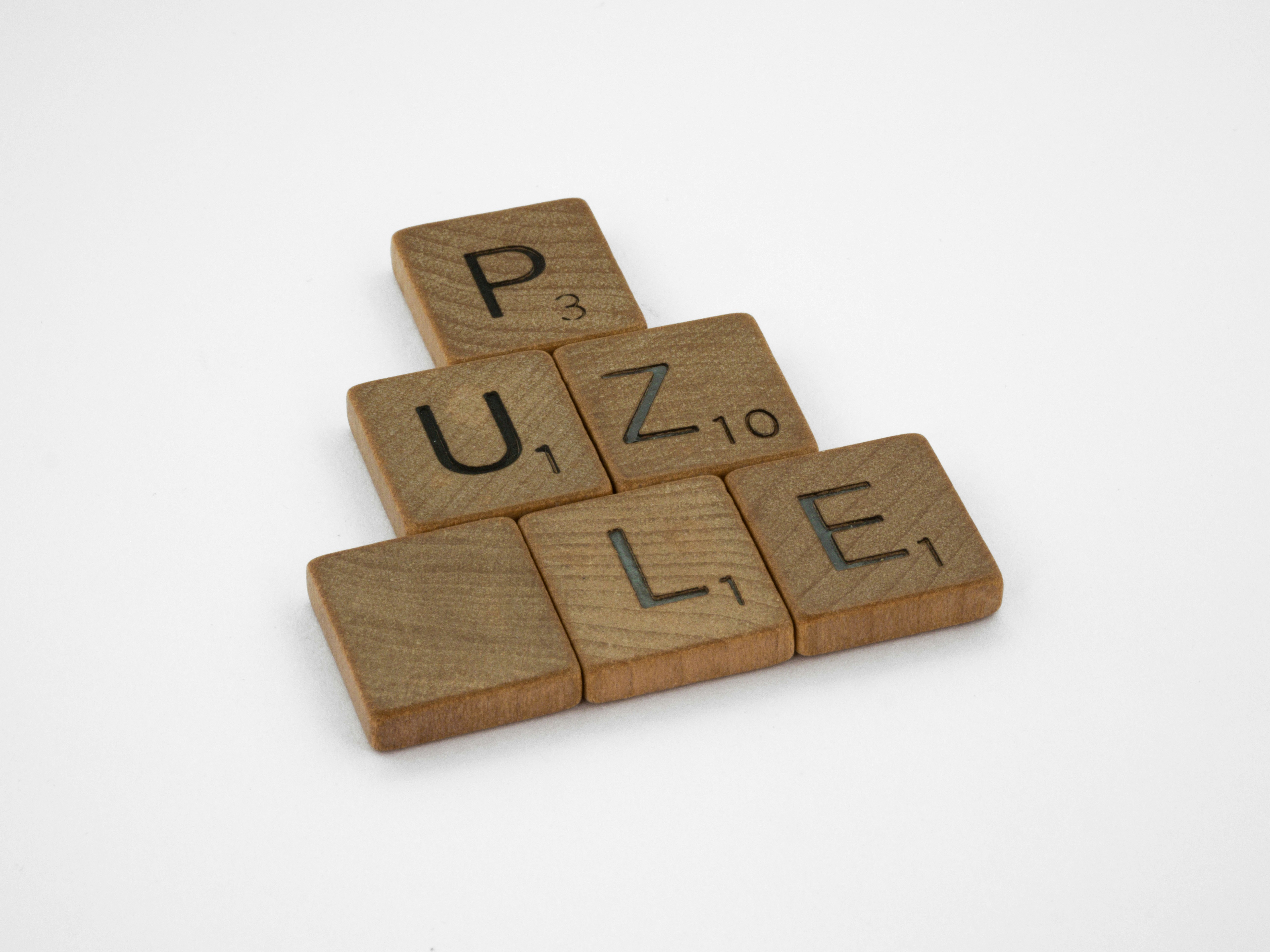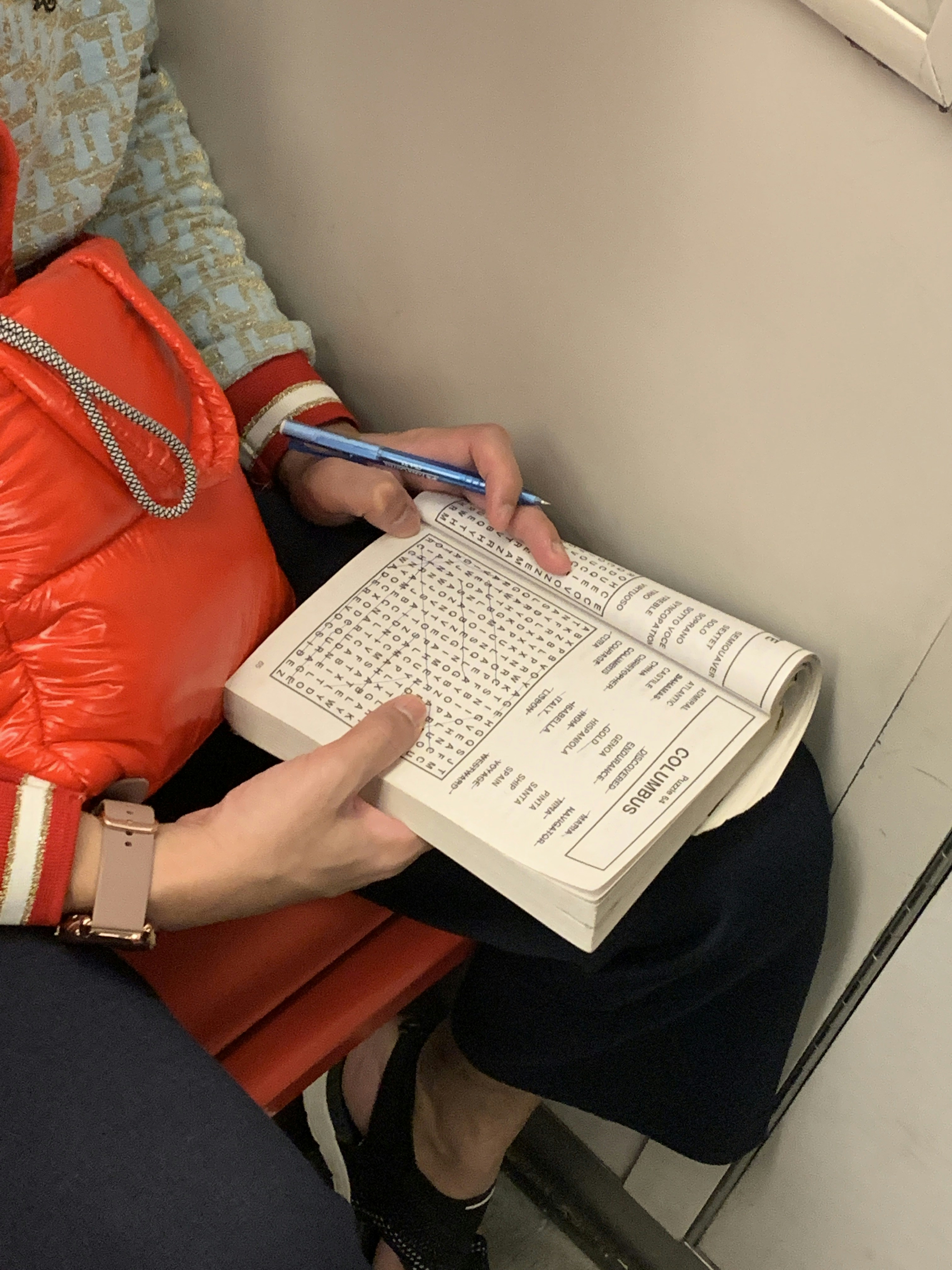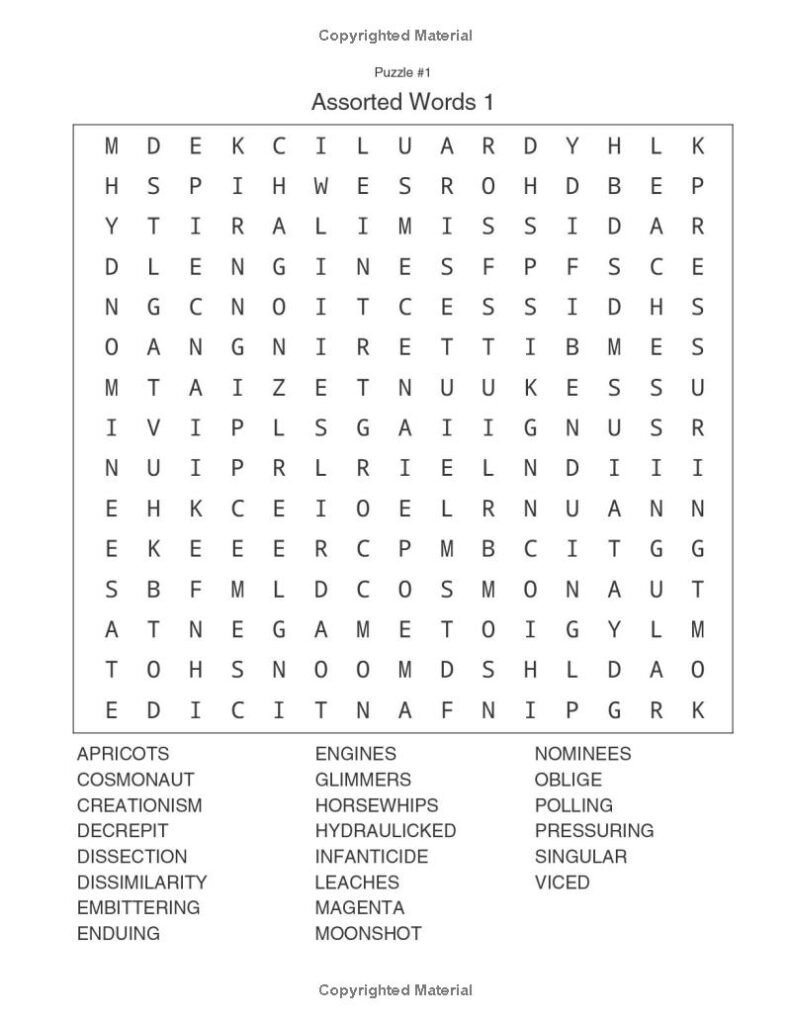Introduction to Word Search Puzzles
Word search puzzles are a popular form of word game where players look for and find words hidden within a grid of letters. The words can be arranged in various orientations—horizontally, vertically, diagonally, and even backward—which adds to the challenge of the task. Originating in the 1960s, these puzzles gained traction as an engaging recreational activity for both young and older generations. The first known word search puzzle was created by Norman E. Gibat and published in the newspaper “Selenby,” heralding the birth of this entertaining pastime.
Over the decades, word search puzzles have evolved from simple grids to increasingly complex variations. They can now be found in various formats, such as dedicated puzzle books, mobile apps, and online platforms, reflecting their growing popularity as a versatile form of entertainment. Designers often incorporate themes and categories, allowing players to enjoy tailored experiences that cater to their interests, whether it be sports, nature, or literature.
Engaging with word search puzzles offers numerous cognitive and mental health benefits, making them not only enjoyable but also highly productive activities. Regular participation in these puzzles can enhance problem-solving skills, improve vocabulary, and foster better concentration. Additionally, working on word searches promotes a state of mindfulness, allowing individuals to reduce stress and immerse themselves in a satisfying challenge. This cognitive engagement can stimulate the brain, contributing to overall mental agility, which is particularly beneficial as one ages.
As the popularity of word search puzzles continues to grow, they have become a beloved pastime worldwide, appealing to a broad audience. Their accessibility and inherent flexibility make them an ideal choice for anyone seeking both entertainment and mental stimulation.
What Makes a Word Search Puzzle Hard?
Word search puzzles vary significantly in difficulty, and several factors contribute to the overall challenge they present. One of the primary elements influencing difficulty is the size of the grid. Larger grids inherently contain more letters, and this increased complexity can make it more difficult for solvers to locate the hidden words. A 20×20 grid, for example, poses a greater challenge than a standard 10×10 grid, as the density of letters can obscure the words one is trying to find.
Another critical factor is the complexity of the words included in the puzzle. Simpler, more common words are easier to spot due to their familiarity and shorter lengths, whereas puzzles riddled with long, obscure, or multi-syllable words can significantly elevate the difficulty. These terms not only increase the time it takes to locate them but also require a deeper understanding of vocabulary, which can be a barrier for many solvers. Additionally, including some words that may have multiple meanings or spellings may divert attention and complicate the search process.
Thematic elements also play a vital role in determining a word search’s difficulty. Common themes, such as animals or food, may offer more accessible vocabulary. However, more specialized themes, such as scientific terminology or historical figures, tend to be more challenging, as they can require advanced knowledge to understand fully. Themes with less familiar associations can turn a seemingly straightforward word search into a formidable challenge.
Together, these factors—the size of the grid, the complexity of the words, and the common themes—create a multifaceted framework that determines how hard a word search puzzle can be. By considering these characteristics, enthusiasts can better prepare for and enjoy the complexities of challenging word search puzzles.
Tips and Strategies for Solving Hard Word Searches
Solving hard word search puzzles can be both enjoyable and intellectually stimulating. To enhance your efficiency in tackling these challenging brain games, it is beneficial to employ a range of strategies. A systematic approach is essential. Start by scanning the puzzle for any words that catch your eye immediately. This initial sweep can give you clues about where to focus your efforts.
One effective technique is to begin your search from the corners of the grid. Often, the first and last letters of hidden words are located at these strategic points. By focusing on corners, you can quickly identify potential starting points for words that may run horizontally or vertically. Additionally, paying attention to unique letters can be advantageous. For instance, letters like ‘Q’, ‘X’, or ‘Z’ are less common and can serve as anchors when you’re searching for terms that include them.
Another strategy involves employing an elimination method. Once you’ve identified a word that fits within the puzzle’s grid, cross it off your list. This not only keeps you organized but can also help clear your mind to focus on remaining words. A visual approach is also useful; consider highlighting or marking your findings. This method not only enhances clarity but prevents the repetitive scanning of the same areas.
Moreover, familiarizing yourself with puzzle styles can provide insights into solving them more quickly. For instance, some word searches may group related words together, while others may scatter them throughout the grid. Understanding these patterns allows for a more strategic search. In conclusion, utilizing these methods will enhance your ability to solve hard word searches efficiently, making the process not just easier but more enjoyable.
The Benefits of Solving Hard Puzzles
Engaging in hard puzzles, such as word searches, offers a multitude of cognitive benefits backed by various research studies. One significant advantage of solving complex puzzles is the enhancement of memory. According to experts in cognitive science, regular engagement in mentally stimulating activities like challenging word searches can bolster both short-term and long-term memory retention. This improvement occurs as the brain is exercised in recalling words and patterns, thus strengthening neural connections that are integral for memory processing.
Furthermore, tackling hard puzzles cultivates problem-solving skills. The intricate nature of these challenges requires solvers to strategize and think critically, evaluating various approaches to arrive at a solution. This analytical exercise conditions the brain to identify patterns, recognize relationships, and develop logical reasoning abilities. A study published in the Journal of Cognitive Psychology emphasizes that frequent puzzle solvers exhibit enhanced capability in navigating complex problems in real-life scenarios, reinforcing the notion that the skills gained are transferable beyond the puzzle itself.
Another noteworthy benefit is the increase in attention to detail. Hard word searches often necessitate a keen focus as players must sift through letters to spot hidden words. This practice can translate to improved concentration in daily tasks. Neuroscience research indicates that activities requiring meticulous observation help sharpen visual-spatial skills. With consistent practice, individuals may find their overall attention span and ability to concentrate on detailed tasks significantly improved.
Incorporating challenging puzzles into one’s routine is not only enjoyable but also serves as an effective strategy for maintaining mental agility and promoting cognitive health. The combination of improved memory, enhanced problem-solving skills, and increased attention to detail makes solving hard puzzles an invaluable activity for individuals looking to challenge their minds.
Types of Hard Word Search Puzzles
Word search puzzles have evolved considerably over the years, leading to a variety of challenging types that cater to different interests and skill levels. Understanding these types can significantly enhance the puzzle-solving experience, especially for those seeking a more demanding challenge.
One common category is thematic word searches. These puzzles are centered around a specific topic, such as animals, historical events, or popular movies. Thematic searches often include a rich array of related words, making it essential for solvers to have prior knowledge of the theme. This added dimension can make locating words more complex, especially when infrequently used terms or obscure references are included.
Another popular variant is the seasonal puzzle, which draws inspiration from holidays or specific times of the year. For instance, Christmas-themed word searches might incorporate terms associated with festivities, decorations, and traditional foods. Such puzzles not only test linguistic acuity but also cultural knowledge, posing a unique challenge as people navigate both common and uncommon vocabulary related to the season.
Puzzles with a specific focus, such as those that require the solver to find words hidden in unconventional patterns or orientations, represent another challenging category. These puzzles may present words arranged diagonally, backward, or even spirally. This design compels solvers to concentrate more intently on the grid, elevating the difficulty level significantly.
Lastly, multi-layered word searches introduce an additional level of complexity. These puzzles may combine varied themes, or require the identification of hidden phrases or clues, compelling solvers to engage in deeper critical thinking. Each type of hard word search puzzle offers unique challenges that can enhance one’s cognitive skills and provide hours of entertainment.
How to Create Your Own Hard Word Search Puzzle
Creating a challenging word search puzzle is an engaging and rewarding endeavor. To begin, you first need to select a theme or a specific list of words you want to incorporate into your puzzle. This could range from vocabulary related to literature, science, animals, or even specific industries. A well-defined theme will not only make the puzzle more coherent but also enhance its overall appeal. Aim for a balanced mix of long and short words to keep the puzzle engaging yet challenging.
Next, design the grid where the words will be placed. A standard hard word search puzzle typically ranges from 15×15 to 20×20 squares. If you are aiming for higher difficulty, considering increasing the grid size. Use graph paper or digital design tools which offer flexibility in layout. Begin placing the words in various orientations: horizontally, vertically, and diagonally. This will significantly elevate the challenge level. Additionally, consider overlapping letters where possible; this strategy not only maximizes space but also adds an extra layer of complexity.
Once all the words have been placed, fill the remaining grid spaces with random letters. This randomness is crucial as it will obscure the words and make it more difficult to find them. It’s also recommended that you assess the puzzle’s difficulty level after its completion. Testing the puzzle, ideally by a person unfamiliar with the words, is essential for this phase. Ask for feedback on the puzzle’s level of challenge. If the feedback suggests it is too easy, consider adjusting the placement of words, increasing grid size, or adding more letters around the target words. Alternatively, if it is deemed too difficult, removing unnecessary overlapping or shortening the word list may help.
Best Resources for Hard Word Search Puzzles
As word search enthusiasts seek to challenge their minds, it is essential to know the best resources available for hard word search puzzles. Several books, websites, and mobile applications cater to various preferences and provide an extensive array of puzzles suitable for different difficulty levels.
One of the most reliable sources is specialized puzzle books available in bookstores and online. Titles such as “Ultimate Word Search: 300 Puzzles” and “The Big Book of Word Searches” offer a vast collection of challenging puzzles. These books often contain a range of themes, keeping users engaged while providing cognitive challenges. Additionally, many of them come with varying levels of difficulty to suit both novice and experienced puzzlers.
Several websites also serve as excellent platforms for accessing hard word search puzzles. Websites like Puzzle Baron and AARP offer a diverse range of word search challenges that users can complete online. These platforms often update their content regularly, ensuring that users return for new and interesting puzzles. Some sites even allow users to customize word searches based on specific themes or categories, catering to personal preferences.
Mobile applications have gained popularity in recent years, providing convenient access to word search puzzles. Apps like “Word Search Pro” and “Word Search” available on various app stores offer thousands of puzzles with varying difficulty levels. Many of these applications feature user-friendly interfaces and options for customization, allowing players to track their progress and compete with friends, enhancing the overall experience.
In conclusion, whether one prefers books, websites, or mobile applications, there is a wealth of resources available for hard word search puzzles. By exploring these options, puzzle enthusiasts can find the best sources to challenge their minds and enjoy intricate word search challenges.
How to Join a Community of Word Search Enthusiasts
Engaging with a community of word search enthusiasts can significantly enhance your enjoyment and mastery of puzzles. To begin, consider exploring online forums and social media groups dedicated to word searches. Websites like Reddit host specific subreddits, such as r/Wordsearch, where users share their favorite puzzles, strategies, and tips for improvement. Participating in discussions within these forums allows you to connect with fellow enthusiasts, discover challenging puzzles, and seek advice when faced with particularly tough challenges.
In addition to online spaces, many social media platforms, including Facebook and Instagram, have groups or pages centered on word searches. These platforms often feature daily or weekly challenges, offering a fun way to test your skills while interacting with others who share your passion. By joining these groups, you can not only access a wealth of puzzles created by others but also share your own creations to contribute to the community.
For those who prefer in-person interactions, consider looking for local puzzle clubs or interest groups. Libraries, community centers, or educational institutions may host regular meet-ups for puzzle enthusiasts. Participating in these gatherings provides an opportunity to engage face-to-face with fellow word search fans, explore new techniques, and participate in competitions that can further refine your skills.
The sense of camaraderie found in these communities is invaluable. By sharing tips and strategies for solving intricate word searches, you can enhance your performance while making new friends in the process. To thrive in these environments, actively participate in discussions, contribute to challenges, and remain open to learning from others. Connecting with fellow word search lovers can create a rich experience that fuels your passion for puzzles.
Conclusion: The Fun of Hard Word Searches
Word search puzzles have gained a significant following due to their ability to entertain and challenge players of all ages. Engaging with hard word search puzzles not only provides enjoyment but also serves as a beneficial exercise for the mind. As a person immerses themselves in these intricate puzzles, they enhance essential cognitive skills such as pattern recognition, vocabulary development, and concentration.
Throughout this guide, we have highlighted the importance of tackling more challenging word searches. These puzzles encourage critical thinking and problem-solving abilities, as players navigate through complex grids filled with sporadically placed words. The sense of accomplishment that comes from successfully identifying all words amid the clutter cannot be overstated. Such triumph serves as a reminder of one’s cognitive prowess and ability to tackle difficult tasks—an empowering experience that can translate beyond the realm of puzzles into daily challenges.
Furthermore, hard word searches present an excellent opportunity for social interaction. Players can engage in friendly competition, collaborating to complete puzzles or timing themselves for a race against the clock. This communal aspect adds an extra layer of enjoyment to the challenge, fostering connections with others who share a passion for wordplay. Whether solving alone or with friends and family, hard word searches can lead to memorable moments and laughter.
As you explore the world of word search puzzles, consider incorporating challenging varieties into your routine. Embrace the intellectual stimulation they provide, pushing the boundaries of your mental capabilities. With a plethora of hard word searches available, you can continuously test and expand your skills. So, grab a pencil, pick a puzzle, and dive deep into the exciting journey that hard word searches offer. Your mind will thank you!



